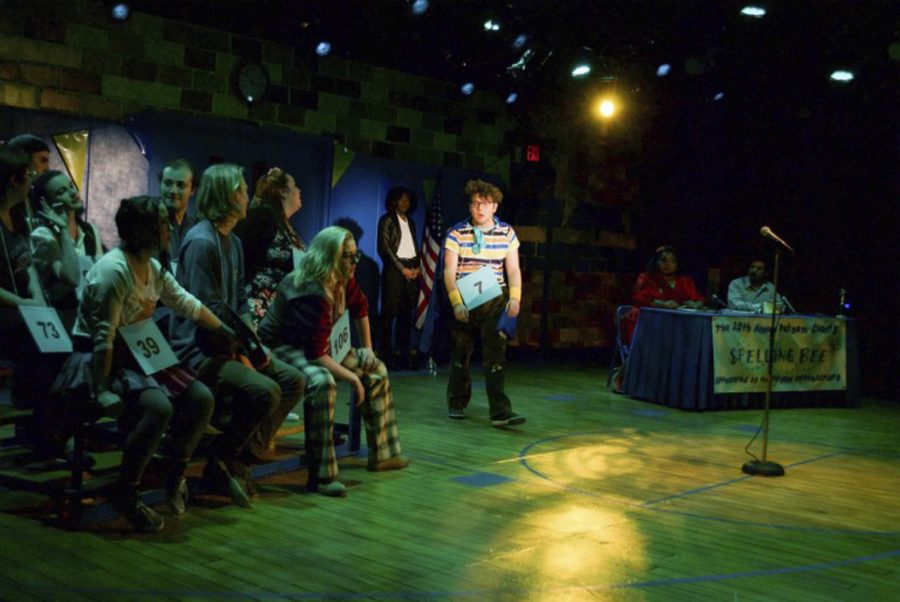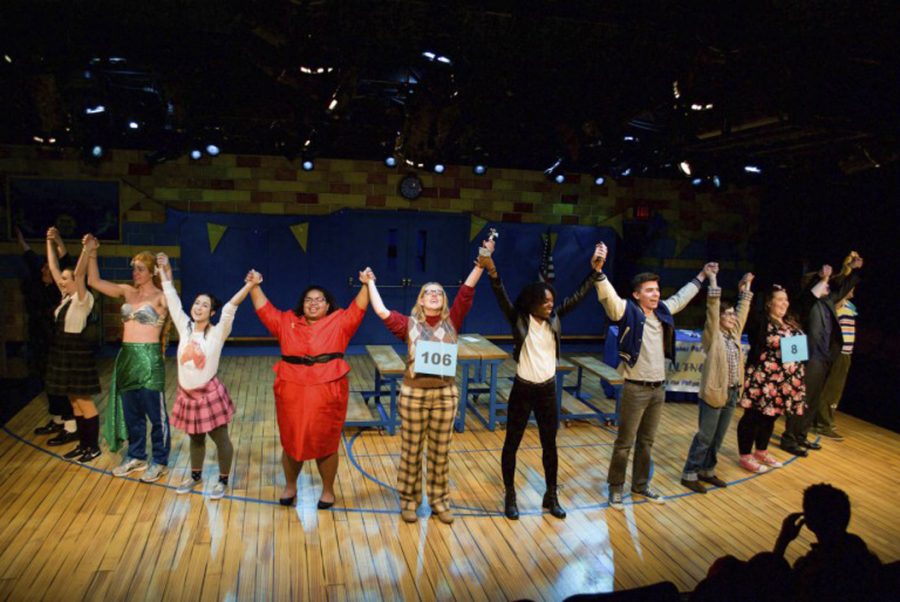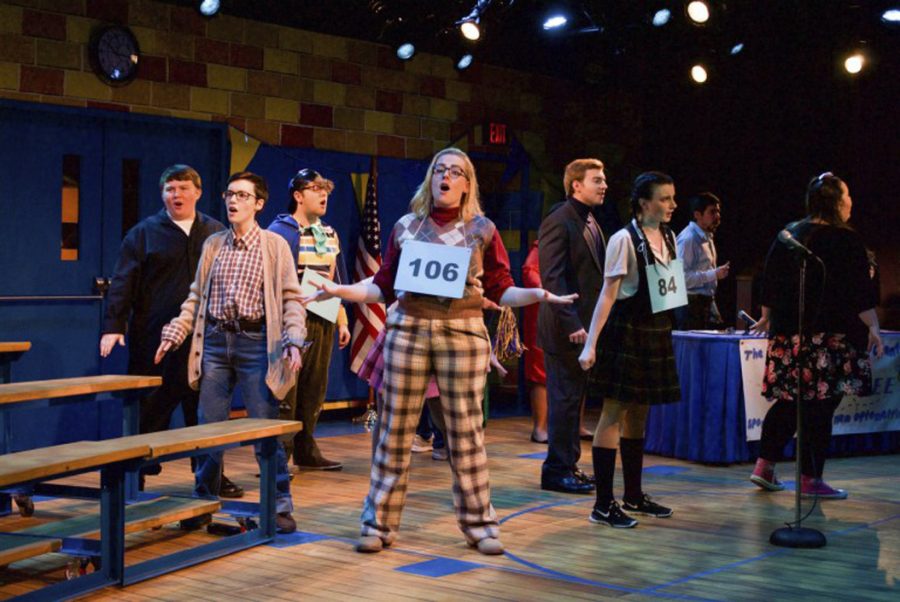You don’t need to know how to spell “dramaturgy” to see the theatre department’s newest play — but it would probably help.
While some of the vocabulary may require a college reading level, the actors in Pitt Stages’ current production ask viewers to think back to a time when even the most infinitesimal problems seemed elephantine.
“The 25th Annual Putnam County Spelling Bee” is a one-act musical comedy originally written in 2004. The 2005 Broadway production won two Tonys, including one for Best Book of a Musical, and shouldered five other nominations plus a Grammy nomination for Best Musical Theater Album.
Pitt is having its own showcase of the play, at the Henry Heymann Theater in the basement of the Stephen Foster Memorial. The performances are currently showing and run through Sunday Feb. 19, with showtimes every night at 8 p.m., except Sunday’s matinee at 2 p.m.
The performance is character-heavy, and the entire play takes place during a local spelling bee. Nearly every character is middle school-aged, requiring the cast to revert back to that awkward stage of tweenhood to embody the melodrama of middle school.
As exceptions to the young age range, former Putnam County Spelling Bee champion Rona — played by Adia Augustin — moderates along with Vice Principal Doug Panch, who is played by Jose Perez IV. Panch has just returned after a five-year break caused by an incident that remains vague.
As pressure mounts, one by one the young spellers step up to the microphone until they hear the ill-fated bell signaling a misspelled word.

Leaf Coneybear, played by Corey Forman, who also works at The Pitt News, shows his nerves as he spells each word he’s given. He’s at first cautious and unsure, then like a possessed water sprinkler suddenly enunciates each letter as his head scans the theater.
One of the cast’s challenges is to take a seemingly insignificant spelling bee — which many school-age children take part in at some point — and get the audience to understand the competition’s significance for the young spellers. On this front, the cast’s memorable performances flesh out their young but layered characters.
The spellers include almost every archetype of middle school angst: there’s the casual talent of jock Chip played by Alex Dittmar or Dustin Butoryak depending on when you see the show, the Catholic schoolgirl Marcy played by Lauryn Morgan Thomas and the pressured-by-her-dads-to-do-well Logainne played by Jenn Mikitka.
There’s also Leaf, the odd one in the bunch who makes his own clothes, and William Barfee with the deviated septum, played by Rachelmae Pulliam.
To express the characters’ young ages, and to complement their disproportionate concern with the outcome of the spelling bee, cast members worked on carrying themselves the way a middle schooler would.
Harry Hawkins IV, a recent Pitt graduate and computer engineering major, choreographed the show, taking the characters’ ages into account. He said the choreography for this particular type of play was a departure from his usual work, such as his work on the department’s production of “Nine” last April.
“A lot of the numbers, the choreography was more getting them around the space in creative manners,” he said. “[For example,] numbers like ‘Pandemonium,’ where you see a little bit of choreography but it’s mostly them just running around the space.”
Hawkins also tried to inject a more childlike nature into the show’s choreography by asking the cast members how their emotions would play out differently if they were younger.
“There were points where I had them move around the space but I had them more aware of how their body moves and taking that and making it more immature,” he said. “Not necessarily in the choreography itself, but you get a lot with how they sit or how they walk around the space.”
To accomplish this childlike behavior, Forman’s Leaf is played with a boundless energy, as he runs around the auditorium in a cape depicting a haphazard solar system. When Panch asks him to spell “capybara” he coyly replies, “Is that even a word?”

In addition to relearning how to walk, talk and dance like sweaty-palmed middle schoolers, the cast members have to stay on their toes and interact with different audience members at each performance.
The show is part script reading and part improvisation, according to Robert Frankenberry, lecturer in the musical theater department and the play’s director.
“Our first job is don’t screw it up,” Frankenberry said. “Then it’s to let loose and play with it.”
To make the competition even more personal for the audience, playgoers can sign up outside the theater to be a “guest speller,” which means sharing the bleachers with the actors on a stage outfitted like a school gym and participating in the bee.
“Part of the reason it’s there is to make the audience feel more like they’re at an informal event,” he said.
Audience members roamed the flush stage to play schoolyard classics such as hopscotch and cornhole before the show.
By encouraging audience participation, the performance not only takes the cast back to the days of unicorn backpacks and Ninja Turtle lunchboxes, but brings the audience along for the ride, too.
The audience participation may even change the performance from night to night, according to Mikitka — a junior media and professional communications major who plays Logainne in the show.
“It gives kind of a different vibe,” Mikitka said. “Because sometimes they interact and sometimes they are kind of uncomfortable being there and each one is different.”
Panch’s interactions with guest spellers are a highlight of the show. When a guest speller receives the laughably easy word “cow” and jokingly asks for it to be used in a sentence, Panch responds with the same dryly sarcastic tone we often pitch at smart-mouth kids: “Please, spell ‘cow.’”
“It helps keep the performers on their toes actually,” Frankenberry said. “It’s never the same show twice.”


